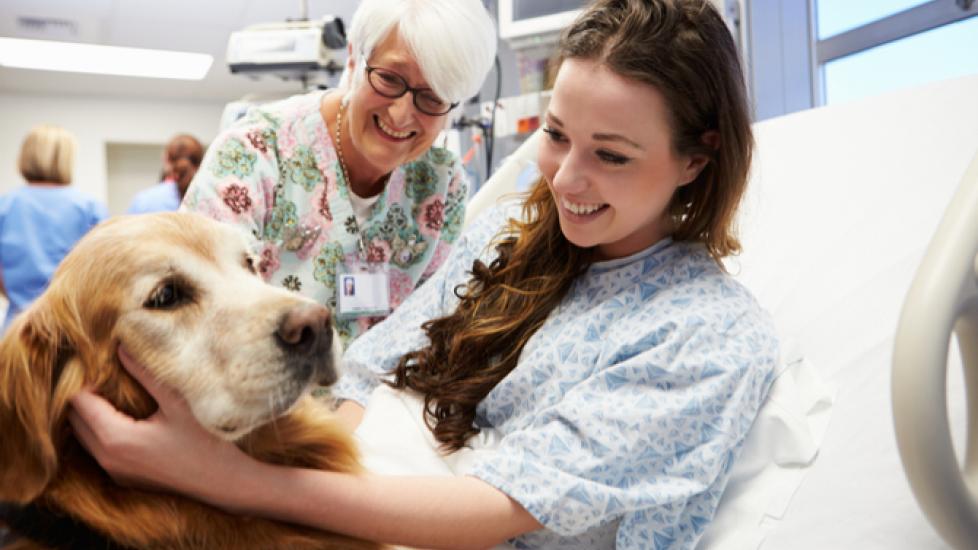Pet Visits in Hospitals: What Are the Risks?
Recently I read a story about a young woman who snuck a dog into the hospital to visit her sick grandmother. My first thought was, "that is so sweet!" But my second thought was, “I hope this doesn’t become a trend.” I love the idea that people can have their whole support system in the hospital, but I also believe that breaking the rules to do so is selfish. It puts other people at risk and is counter-productive toward convincing hospitals that pet owners are responsible.
As a dog mom, I know how much snuggles with my fur kid make me feel better. I want my dog around when I don't feel well—especially if I were sick enough to be in the hospital. In fact, research shows dogs reduce anxiety in the hospital, something that many people experience. Anxiety can slow healing, something that often effects my treatment plan for cats and nervous dogs at my own practice. I’ve even let a housemate stay with a hospitalized animal to reduce anxiety, when it was appropriate.
But I also know that there are a lot of good reasons the rules are in place prohibiting or restricting pets in the human hospital. Some hospitals allow personal pets to visit while others don’t. If the hospital your family member is in does not allow personal pets, there are probably good reasons.
Why Hospitals Have Personal Pet Policies
When hospitals prohibit animals, they are doing so out of concern for the health of their patients. Some people in the hospital are very sick and may have compromised immune systems. Some may even have dog allergies. So, dog hair and dander may make these people feel worse or may slow their improvement. The hospital may not have adequate air filtration to handle pet dander or there may be other infrastructure concerns that prevent hospital administration from allowing pets.
After doing some research, I learned that more and more hospitals are allowing animal visitation. Many hospitals have their own therapy dogs who will visit patients. Others only allow service or therapy dogs. Those that do allow personal pets have strict standards for who they allow in. For example, a few hospitals will allow cats while others allow miniature horses that are used as service animals. Hospitals require that your companion animal be up to date on vaccines, house-trained, clean, and healthy. The dog must be quiet and good around strangers. The hospital should not be the first place you take your unsocialized dog.
Some hospitals have restrictions on which patients can bring their personal companions. These hospitals usually restrict visits to long-term patients (staying several months or more), patients who are at the end of their lives, or children. Some hospitals only allow visits in certain places in the hospital. This seems like a great compromise but of course requires patients to be able to leave their rooms.
To manage pet visitation, hospitals may have to add staff to screen dogs, which might require taking money out of the budget for nursing or sanitation staff or other services. This can be a powerful factor against allowing pets to visit.
To bypass this, there is a cool group in Canada that will help you check all the boxes for permission to bring your pet into the hospital. It’s called Zachary’s Paws. My favorite part of this group’s work is that it will foster elderly patients’ animals while they are in the hospital so that no one has to give up their beloved companion due to illness.
It is worth calling the hospital to find out whether it allows personal companion animals or get your loved one on the list for a visit from a therapy dog. If you have any choice in which hospital you use, choose one that does allow pets and tell the staff this was part of your decision process. If you or a loved one is in a hospital that doesn’t allow pets, tell the hospital that you would like it to reconsider its policy. Hospitals are always looking for ways to improve patient satisfaction (it’s now calculated into their reimbursements from Medicare and some insurance companies).
If you are in the unfortunate circumstance of having a loved one in the hospital, talk to your doctor and support staff. They want to help their patients get better and go home. And if a dog visiting speeds up the process, they just might let you bring your canine companion to the hospital.
Dr. Elfenbein is a veterinarian and animal behaviorist located in Atlanta. Her mission is to provide pet parents with the information they need to have happy, and healthy, and fulfilled relationships with their dogs and cats.
